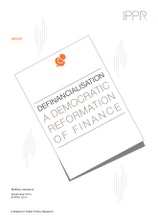Definancialisation: A democratic reformation of finance (IPPR report)

IPPR, the Institute for Public Policy Research, one of the UK’s leading thinktanks, published new report this week. In this report they argue for structural reform to address the deeper institutional arrangements that underpin financialisation and call for establishment of an in-depth parliamentary commission to investigate the role of money and credit within the economy.
This report sets out an ambitious agenda for ‘definancialisation’, for rolling back the socially useless aspects of modern finance and advancing both its productive potential and the democratic interest over its activities and objectives.
“By doing so, our recommendations should help to build a financial system that operates without public subsidy (the ‘bailouts’), where rent-seeking is limited, and where the relationship between finance and production is substantially tightened.”
Their proposals are:
Targeting credit at the productive economy – principally by giving the Bank of England the mandate to monitor and guide credit creation and flow
Reassert the public interest in the financial system
Establish a Monetary Commission to investigate the UK’s monetary system
Strengthen equity ratio requirements to remove the implicit public subsidy to banks
Create a Financial Product Board to approve new UK-traded financial products
Establish an EU credit-ratings agency funded by the financial transaction tax
Invest the gains of financialisation to help fund public expenditure – by establishing a national wealth fund that is able to accumulate some of the gains of financialisation and support the country’s long-term service and investment needs
Here’s an extract:
The vital importance of the credit and money system is veiled in contemporary debates despite its crucial role in shaping the nature of the financial system, the dynamic of economic growth and the interplay of wider social relations. Tellingly, for example, the recent, lengthy Parliamentary Commission on Banking Standards almost entirely ignored the issue. This is despite the fact that the dynamic of our credit system was central to precipitating the most recent crash and creating the UK’s lingering debt hangover. To avoid these mistakes in future, our monetary system should be ‘unveiled’. A Commission should be established to examine how effectively our credit and money systems serve the public interest. In doing so, it should examine radical proposals related to the monetary system, including the potential for the Bank of England to provide central banking services directly to anyone who wants them, not just banks (see Gruen 2014); the possibility of transitioning to alternatives, such as the ‘Chicago Plan’ of 100 per cent reserve banking and the issuance of debt-free money (see Benes and Kumhof 2012); the potential for money-financing the deficit; and the future of ’alternative’ currencies. Similarly, the payment system is crucial to the smooth functioning of the economy yet its oligopolistic ownership structure and opaque operation hinders financial innovation and entry by new financial institutions, and imposes disproportionately high costs on small and medium-sized businesses (SMEs) (OFT 2013). A holistic review of how the system operates should also be included. While none of the suggested alternative models are without flaws, nor is the current system, and a thorough examination of the UK’s monetary, credit and payment system is long overdue.
Establish a Monetary Commission

The UK has not effectively examined how its money and credit system operates since the Macmillan commission in the 1930s. Yet in that time the nature of money and the scale of credit has changed significantly. Moreover, how credit is created, circulated and accumulated has vital consequences for the UK’s economic and social wellbeing, something increasingly recognised in mainstream debate (see Wolf 2014, Pettifor 2013a). For as Geoffrey Ingham argues, the money system has a dual nature: it ‘is not only infrastructural power, it is also despotic power’ (Ingham 2004)
We therefore need a much better understanding of the nature and role of money and credit if we are to shape the monetary system to best support economic and social wellbeing.
We therefore recommend that an in-depth parliamentary commission should be
established to investigate the role of money and credit within the economy. This should be a coda to the Parliamentary Commission on Banking Standards, which reported in 2013 and, tellingly, ignored the role of money within banking. The new Monetary Commission should consequently examine how the money system currently operates and the distributional effects it creates, particularly during a period of sustained ‘abnormal’ monetary policy, as the UK has experienced over the past half decade or more; how effectively it supports broad-based, sustainable growth; and how the UK could potentially support a more democratic money and credit system in future.
Against these overall objectives, there are a range of particular areas the commission could choose to investigate.
Fundamentally, it should investigate credit creation in the UK economy and its part in creating imbalances of economic power. What impact does the banks’ power to create money have on entrenching unequal economic power within society, given that most new money enters the economy through consequential debt contracts that favour the creditor, who has been privileged with the right to create credit in the first place? Is this system of credit creation arranged so that it effectively supports the real economy, given that currently so much credit circulates within the financial system without any connection to production?